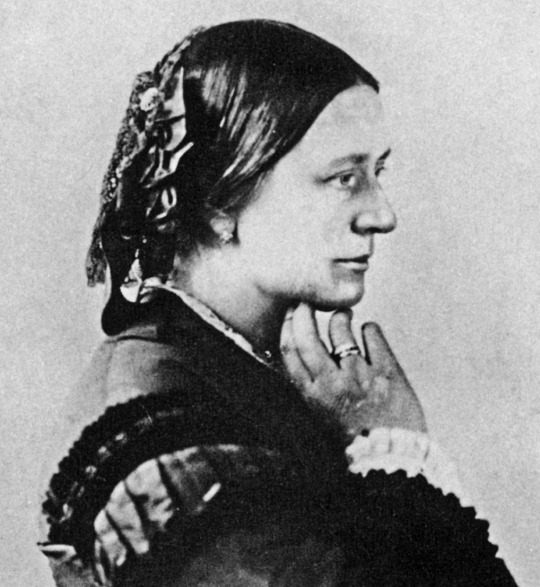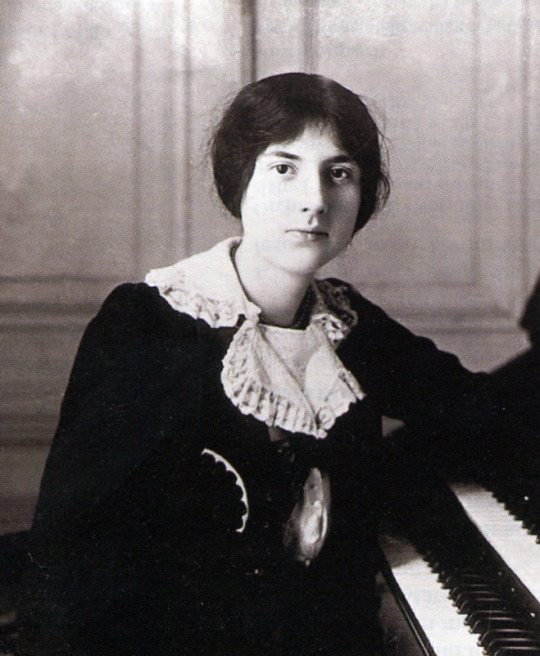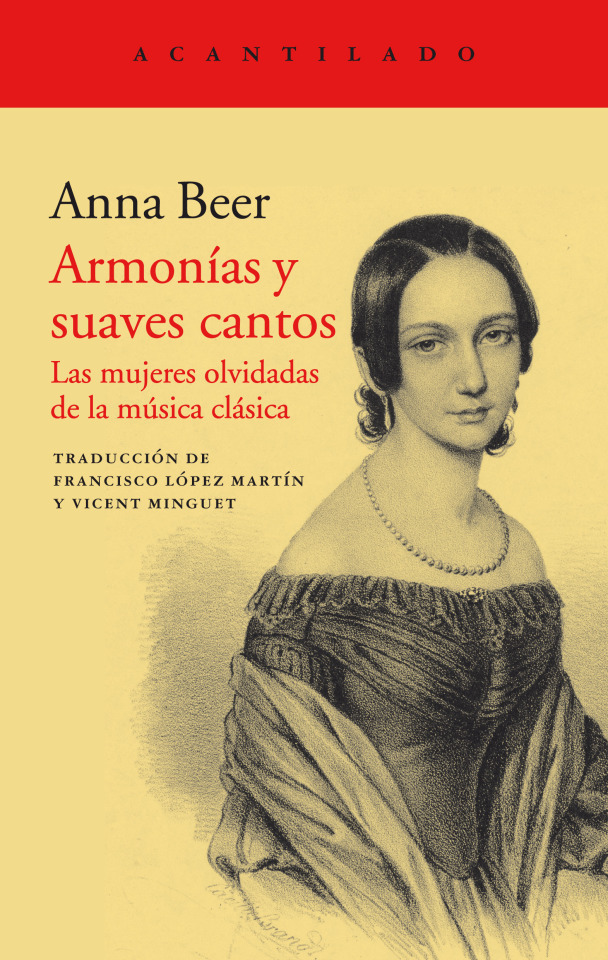#isabella leonarda
Explore tagged Tumblr posts
Text
youtube
Isabella Leonarda (1620-1704) - Violin Sonata in D Minor, Op. 16 No. 12:
I. Adagio - II. Allegro e presto - III. Vivace e largo - IV. Spiritoso - V. Aria. Allegro - VI. Veloce ·
Marcin Świątkiewicz, organ · Rachel Podger, violin
4 notes
·
View notes
Text
youtube
Isabella Leonarda / Cappella Strumentale del Duomo di Novara, Op. 16, Sonata terza: I. Adagio - Presto - Adagio I Sonate a 1, 2, 3 e 4 istromenti, Op. 16, 2012
6 notes
·
View notes
Text
Isabella Leonarda: '12 Sonatas, Op.16', Sonata Terza (1683)
youtube
0 notes
Text

Isabella Leonarda (6 September 1620 – 25 February 1704) was an Italian composer.
0 notes
Text
Mi crítica del concierto de Anna Urpina y Nicola Brovelli anoche en el Alcázar.
#anna urpina#nicola brovelli#dario castello#giovanni battista fontana#isabella leonarda#francesca caccini#domenico scarlatti#arcangelo corelli#música#music
0 notes
Text
Isabella Leonarda: Baroque Innovator and Sacred Music Pioneer
Isabella Leonarda (6 September 1620 – 25 February 1704) was a remarkable Italian composer whose work echoes through history from the tranquil confines of Novara. A true pioneer of her time, Leonarda composed a wealth of music while living in the Collegio di Sant'Orsola, an Ursuline convent where she dedicated her life to both spiritual and musical pursuits.
Early Life and Entry into Music Born to an influential Novarese family, Isabella Leonarda's musical journey began at the age of 16 when she entered the Collegio di Sant'Orsola. Her family’s connection to the convent, thanks to their benefactions, likely played a role in her deep involvement in its musical life. Over the years, she held several important positions within the convent, including madre (1676), superiora (1686), madre vicaria (1693), and consigliera (1700).

Musical Contributions Leonarda is celebrated as one of the most prolific female composers of the Baroque era, having composed nearly 200 works throughout her lifetime. Although she was not widely known outside Novara during her lifetime, her music was deeply admired locally. Among her significant achievements is her pioneering role in the publication of instrumental sonatas, with her Opus 16 being the first sonata da chiesa published by a woman.
Her compositions cover a broad range of sacred music genres, including motets, sacred concertos, psalm settings, responsories, Magnificats, and litanies. Leonarda's works are notable for their intricate harmonies and innovative use of musical forms, setting her apart in the Baroque music scene.
Teaching and Influence Leonarda's impact extended beyond her own compositions. By 1658, she was recognized as magistra musicae, indicating her role as a music teacher within the convent. Her influence was felt among her peers, as her compositions often served as models of polyphonic sophistication and creativity.
Musical Style and Innovations Leonarda’s music reflects a deep understanding of counterpoint and a keen sense of structure. Her sonatas, in particular, deviate from the standard four-movement form popularized by Arcangelo Corelli, featuring a variety of movements and unusual formal structures. This experimentation contributed to the rich tapestry of Baroque instrumental music.
Dedications and Legacy A unique aspect of Leonarda’s published works is their dual dedication: one to the Virgin Mary and one to prominent figures such as the archbishop of Milan, the bishop of Novara, and Emperor Leopold I. These dedications often served to secure financial support for the convent, demonstrating the practical considerations behind her compositions.
Isabella Leonarda’s dedication to music and her innovative contributions have left a lasting legacy, marking her as a trailblazer in the realm of sacred music. Her work continues to inspire and resonate, a testament to the enduring power of creativity and devotion
0 notes
Link
0 notes
Video
youtube
For my second post today in our Female Composers series, I’ll head waaaay back to the far end of the timeline, with this Sonata duodecima in D minor for violin solo and continuo (1693) by Isabella Leonarda, an incredibly prolific seventeenth-century composer who spent her entire adult life teaching and writing music in an Ursuline convent. Played her by Bizzarrie Armoniche, this is just one of countless gorgeous compositions waiting to be discovered by this composer. Treat yourself to as many as you can find! - Melinda Beasi
#isabella leonarda#female composers#woman composers#women#17th century music#classical music#early music#baroque music#chamber music#musica in extenso#continuo#violin
24 notes
·
View notes
Text
Mostly Mezzo Mondays: Invernizzi sings Leonarda and Monteverdi
Just one broadcast on this week’s list, but I’m keen to hear it:
Roberta Invernizzi sings works by Isabella Leonarda and Claudio Monteverdi with the group Qvinta Essençia. Deferred broadcast (of a live performance recorded in May) Tuesday, November 9 on Catalunya Música.
0 notes
Text
Tag Nine (9) People You’d Like to Get to Know Better!
I was tagged by @tarisilmarwen. Thank you so much, Tari, as always! I’m glad to be someone you would like to know better, because I’m glad to know you, too. 💜
Three ships: Two OC/EC ones, plus Kanera.
First ever ship: Spock with a female Vulcan OC many years ago.
Last song/album: Some cantatas by Dieterich Buxtehude (1637–1707) as I exercise. Yes, early music geek here!
Last movie: Probably the one a singer friend of mine sent me the other month or so of him performing a short cantata by the seventeenth-century nun-composer Isabella Leonarda (1620–1704) with a small baroque orchestra. Does that count? I hope so, because I haven’t had the chance to sit down and watch an actual feature film in quite a while! 😛
Currently reading: Recently it’s been various cookbooks and feeble attempts to catch up on friends’ fanfic stories, but I’m about to go on a road trip and am bringing some Agatha Christie along.
Currently watching: Nothing regularly right now. (Sorry I’m such a boring stick-in-the-mud!) But when I’m staying with my mom we never miss Father Brown and Death in Paradise.
Currently consuming: Nothing yet, because I’m exercising on the elliptical, but I plan to make myself a strawberry-banana smoothie once I’m done.
Currently craving: A nice long, peaceful stretch of time in which to do some fanfic writing.
I’m going to add one, because I’ve seen it in other versions of this game and I like when it is. (Plus, I just have to tell the world! 😁 )
Currently working on: The Book of Gand, part three!
Tagging: @rendar-writes @sassygirl579 @kanerallels @merspots @para-cera-therium @independence1776 @queen-susans-revenge @lasatfat @gondalsqueen @jedi-valjean —and really anyone who sees this who might want like to try!
9 notes
·
View notes
Text
NU FESTIVAL: PAOLO FRESU E DANIELE DI BONAVENTURA
Diciamolo subito, quando Paolo Fresu mette mano alla tromba o al filicorno, qualsiasi spartito interpreti, il risultato è la musica di Paolo Fresu e non altro. Questo potrebbe essere anche un limite, quello dato dalla forte impronta artistica di un musicista che quasi finisce col far passare in secondo piano l’originalità e la bellezza delle partiture originali. È successo così anche ieri sera, nella Basilica di San Gaudenzio a Novara, per lo stupendo concerto di Paolo Fresu e Daniele Di Bonaventura nell’ambito del festival “Nu Arts and Community”. Nel solito incanto della basilica gaudenziana, sono risuonate le note di melodie celebri: “Qual cor tradisti” da “Norma” di Vincenzo Bellini, “Te Recuerdo Amanda” di Victor Jara, “Preghiera di gennaio” di Fabrizio De André, e poi ancora Fito Páesz, Isabella Leonarda, arie celebri e meno celebri, ma sempre con l’inconfondibile imprimatur della tromba, spesso venata di malinconia, del grande jazzista sardo. Con Fresu un altrettanto straordinario jazzista italiano con un grande interesse per la musica classica, quella contemporanea e per la world music, Daniele Di Bonaventura al bandoneon. E proprio di Di Bonaventura sono due dei brani originali presentati, “Capo cadenza” e “Santis”, di grande spessore compositivo e sonoro e ben amalgamati nel complesso programma della serata. Fresu racconta all’attentissimo e stregato pubblico, di come abbia fatto conoscenza con la grande compositrice novarese del Seicento, Isabella Leonarda. Grazie alle ricerche di una studiosa americana naturalizzata italiana, Candy Smith dell’Università di Bologna, nel periodo del lockdown (che detto per inciso sempre ormai diventata anche un’occasione fertile per la creazione artistica), Fresu ha avuto l’occasione di suonare in streaming con centinaia di jazzisti italiani e di farlo proprio su un brano della compositrice novarese, quel “Canone coronata”, di estrema semplicità e di raffinata bellezza che chiude il concerto in San Gaudenzio. Ancora una perla da aggiungere alla collana di questa edizione numero zero del festival di “Nu Arts and Community” che chiude domenica sera una settimana intensa di accadimenti ed eventi artistici, con “Le retour à la raison” di Man Ray con musiche di Teho Teardo alla Sala Borsa.

6 notes
·
View notes
Text
youtube
Isabella Leonarda (1620 - 1704) - Motetti a voce sola, Op. 6: III. O flammæ for Solo Soprano ·
Cappella Artemisia · Candace Smith
3 notes
·
View notes
Note
48. who is your role model? ( Found Family Samantha )
“...Isabella Leonarda, if I’m being honest.”
1 note
·
View note
Text
Mostly Mezzo Mondays: Coote sings Winterreise; Zaïcik sings Strozzi et al.
Mostly Mezzo Mondays: a recurring (though not weekly) feature where, on Monday nights, I blog a list of the upcoming broadcasts that have caught my eye on World Concert Hall. My interests: baroque vocal music, art song recitals, and a list of favorite singers.
Alice Coote sings Schubert’s Winterreise accompanied by Julius Drake in a concert recorded live at Wigmore Hall last month; it’s up for deferred broadcast today. Dedicated Coote (or Drake) (or Schubert) fans may want to compare this this account with the one recorded by the same duo on a Wigmore Hall Live album in January 2012. Tuesday, January 28 on BBC Radio 3. (Should be available for listening on demand for a month afterward.)
Eva Zaïcik has not previously come to my attention but the evidence on YouTube suggests that she sings French baroque repertoire very prettily, if not quite with the expressive chiaroscuro that I like to hear. On Saturday, there’s a chance to hear what she does with the Italian baroque in a concert of works by female composers of the era: Barbara Strozzi, Maria Agnesi, and Isabella Leonarda. With Le Consort. Live broadcast Saturday, February 1 on Klara.
3 notes
·
View notes
Text
Ocho historias de mujeres (y II)
[Viene de la entrada anterior]

[Clara Schumann, nacida Wieck]
6. Clara Schumann (1819-1896). Esa distinción entre música masculina y femenina, gravitó también permanentemente sobre la obra de Clara Wieck, hija de un profesor de piano que la convirtió en una de las grandes virtuosas del instrumento en todo el siglo XIX.
Debutó con sólo nueve años en la Gewandhaus de Leipzig y a los once se cruzó en su vida Robert Schumann, que había ido a estudiar con su padre. La pareja sentimental más famosa de la historia de la música se formó y consolidó en los años siguientes. Robert y Clara acudieron incluso a los tribunales ante la oposición del padre a su matrimonio, que en un gesto desafiante muy notable celebraron un día antes de que ella cumpliera los 21 años, límite legal para su emancipación. Con el tiempo, Friedrich Wieck aceptaría la unión. La pareja tuvo ocho hijos, pese a lo cual Clara no abandonó su carrera de concertista que en la época incluía por supuesto la composición, pues los virtuosos debían de ser capaces tanto de improvisar como de presentar sus propias obras. Como reconoce Beer, la figura de la mujer como intérprete estaba ya plenamente aceptada en la época. Una anécdota resulta significativa al respecto. Robert acompañó a su esposa en muchas de sus giras. Una vez, en Rusia, al final de una actuación, un príncipe local se acercó entusiasmado a saludar a la pianista, quien le presentó a su esposo. “Ah, ¿y usted también es músico?”, preguntó el arist��crata. Pero las convenciones de su época condicionaron la tarea creativa de Clara. “Una mujer no debe desear componer. Ninguna ha sido capaz de hacerlo, así que ¿por qué podría esperarlo yo?”, llegó a escribir en su diario. Pese a ello, dejó varias decenas de canciones y piezas pianísticas así como un concierto para piano(escrito a los 13 años y con el que tuvo gran éxito) y un trío que hoy suele grabarse e interpretarse muy a menudo. Clara sobrevivió cuarenta años a Robert. Nunca volvió a casarse. La naturaleza de sus relaciones con Johannes Brahms nunca ha sido del todo aclarada.
youtube
----------

[Lili Boulanger, muerta en plena juventud]
7. Lili Boulanger (1893-1918). Nieta de una famosa cantante, hija de un compositor que había ganado el Premio de Roma a los 19 años y hermana pequeña de Nadia, que marcó como profesora a generaciones de compositores durante más de medio siglo, la vida de Lili Boulanger estuvo condicionada por la enfermedad.
Resulta ciertamente incomprensible que Anna Beer afirme que “los síntomas físicos de una enfermedad incapacitante y en última instancia mortal se han ocultado a conciencia”, cuando es lo primero que se destaca en cualquier acercamiento a su vida, como inescrutable que diga que sobre ella, a su juvenil muerte, se cernió la sombra de la cortesana sin aportar ni un solo testimonio sobre la cuestión (ni siquiera un chisme). Lili fue ante todo una mujer libre y con un talento universalmente reconocido. Fue la primera mujer en ganar el Premio de Roma y su música tuvo siempre una alta consideración de la crítica. Es cierto que la fragilidad de su salud se unió con cierta frecuencia a esa idea de la delicadeza del eterno femenino, pero hoy día su obra está plenamente asentada. Dejó inconclusa una ópera sobre textos de Maeterlinck en la que empezó a trabajar en 1911. Del resto de su producción, no demasiado amplia por razones obvias (murió antes de cumplir los 25 años), destacan sus obras corales (algunas de las mejores, de naturaleza religiosa) y sus canciones, aunque dejó también piezas de cámara y sinfónicas.
youtube
----------

[Elisabeth Maconchy]
8. Elizabeth Maconchy (1907-1994). Nacida en Inglaterra, formada entre Dublín y Londres, Maconchy sobrevivió a una tuberculosis contraída a los 25 años y aunque uno de sus pulmones quedó seriamente dañado, tuvo una vida larga y de notable independencia artística.
Discípula de Ralph Vaughan Williams, Maconchy ganó becas y distinciones a lo largo de su carrera para acabar siendo nombrada Dama de la Orden del Imperio Británico en 1977. Casada desde 1930 con William Le Fanu, en quien siempre encontró apoyo y estímulo, su carrera musical está marcada por su férrea disciplina, su altísimo sentido autocrítico y unas influencias que iban de Bartók a Schoenberg. Su primer gran éxito fue una obra sinfónica, The Land, que se estrenó en los Proms en 1930, pero son sus trece cuartetos de cuerda compuestos entre 1933 y 1985 los que más elogios unánimes han encontrado. Su obra es muy amplia, incluyendo ballets y óperas breves, una de ellas (El sofá) de un erotismo muy descarnado. De las ocho compositoras cuyas vidas se cuentan en este libro es posiblemente la menos difundida hoy en relación al volumen y peso de su obra y ello puede deberse a diversas circunstancias. Republicana, izquierdista y autora de una música en general austera y no fácil de escuchar, Elizabeth Maconchy nunca fue una compositora cómoda ni amable ni en el Reino Unido ni fuera de él.
youtube
--------------------
Ignoro quién ha aconsejado a Anna Beer ni cuáles han sido los criterios que la han llevado a seleccionar para las ocho protagonistas de su obra a algunas de las compositoras más conocidas y difundidas de la historia de la música, aunque sospecho que la existencia de bibliografía suficiente para documentarse y escribir sobre ellas ha tenido algo que ver. Eso debería haberla alertado y llevarla a pensar que quizás su tesis no era tan consistente como ella pensaba. Pero lo cierto es que tenía a su disposición otros nombres de magníficas compositoras que podrían haber hecho más justicia al subtítulo de su libro. Propondré al curioso lector ocho alternativas: Kassia, Chiara Margarita Cozzolani, Isabella Leonarda, Maria Antonia Walpurgis de Baviera, Anna Bon di Venezia, Louise Farrenc, Elfrida Andrée, Ruth Crawford.
Ancha es la red, y está llena de música.
--------------------
En la edición de papel de Diario de Sevilla se ha publicado hoy, domingo 7 de julio, una edición abreviada y algo distinta en dos páginas: 1 y 2.

[Armonías y suaves cantos. Las mujeres olvidadas de la música clásica. Anna Beer. Traducción de Francisco López Martín y Vicent Minguet. Acantilado, Barcelona, 2019. 426 páginas.]
LISTA DE REPRODUCCIÓN EN SPOTIFY
#anna beer#acantilado#libros#books#clara schumann#robert schumann#friedrich wieck#johannes brahms#lili boulanger#nadia boulanger#maurice maeterlinck#elizabeth maconchy#ralph vaughan williams#william le fanu#bartók#schoenberg#kassia#chiara margarita cozzolani#isabella leonarda#maría antonia walpurgis de baviera#anna bon di venezia#louise farrenc#elfrida andrée#ruth crawford#música#music
1 note
·
View note
